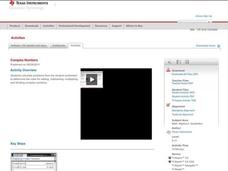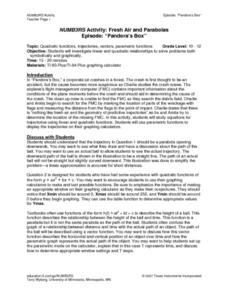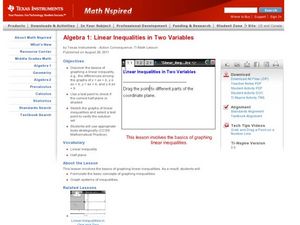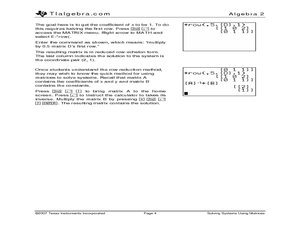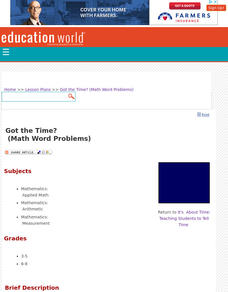Curated OER
Incredible Integers!
There are three parts to this lesson on integers. In the first, learners explore positive and negative numbers on an actual painter's tape number line and by playing a "Hot Seat" game. In part two, they view a BrainPop video and work...
Primary National Strategy
Ordering and Counting
Are you in need of a 5-day unit intended to teach little learners how to count to 20? This is a well-structured complete set of lessons which employ a variety of methods to instruct learners about various ways to count from 1 to 20. They...
Alabama Learning Exchange
Twisted Tangrams
Primary geometers create a picture using tangrams. In this geometry lesson, learners read Grandfather Tang: A Tale Told with Tangrams, cut out their own tangrams, and choose a character from the story to make using their tangram pieces.
Curated OER
Telling Time to the Hour
An engaging presentation on telling time, and figuring out elapsed time, awaits your young learners. Understanding analog clocks an elapsed time are crucial skills for all students to master. This presentation does an excellent job of...
Curated OER
Dilations with Matrices
Examine dilation with matrices with your class. Learners write a conjecture for how the scale factor determines the size of an image. They then use their conjecture to write a matrix multiplication problem for the illustrated...
College Preparatory Mathematics
Geometric Probability
In this geometric probability instructional activity, students solve and complete 12 different problems that include determining the outcomes of various types of probability. First, they use a tree diagram or an area model to compute the...
Texas Instruments
Complex Numbers: Plotting and Polar Form
Explore the concept of, and use the Ti-Nspire to, convert complex numbers into polar form. Then practice graphing complex numbers in the polar coordinate plane.
Curated OER
Complex Numbers
The class practices, on paper and/or on a TI graphing calculator the concepts of how to add, multiply, divide and subtract complex numbers using the correct property.
Curated OER
NUMB3RS Activity: Where’s the Source? Episode: “Undercurrents”
Several real-world problems are posed as a way to learn about vector fields in order to make some predictions after analyzing the data. The main problem comes from the tv show NUMB3RS and is based on solving a crime where a body has...
Curated OER
Application of Completing the Square
A TI technology activity that helps learners to recognize and use the characteristic of a perfect square quadratic to complete the square. Additionally, they apply their knowledge to solve real-world problems.
Curated OER
NUMB3RS - Season 2 - "Convergence" - Air Hockey
Learn how to use a matrix to organize data to solve a problem. This activity uses wins and losses to rank players for an air hockey tournament they wish to have. After practicing some basic matrix operations the class could do the...
Curated OER
Properties of Matrices
A TI-nspire activity to find determinants of matrices using calculators. The class follows along in this step by step activity to explore operations on matrices. They will mostly be multiplying and at the end of the activity they are...
Curated OER
Using Matrices to Enter Data and Perform Operations
Here's a TI step by step guided lesson on matrices. The class enters data into the TI calculator about movie ticket sales and uses matrices as a problem solving tool. They add and multiply matrices to determine profit.
Curated OER
Visualizing Vectors
Investigate vectors in standard positions and use the CellSheet application on the TI calculator to find the sum of two vectors. Convert from polar to rectangular coordinates and vice versa, and show graphs of the vectors.
Curated OER
NUMB3RS Activity: Fresh Air and Parabolas
Explore parabolas and investigate linear and quadratic functions to solve problems symbolically and graphically. Also use parametric functions to display trajectories on a graphing calculator.
Curated OER
NUMB3RS Activity: Coded Messages
Using matrix multiplication and inverse matrices, learners are trying to uncode a coded message. Students encrypt simple messages using 2 x 2 matrices.
Curated OER
Operating on Matrices
Learners investigate matrices by exploring addition, subtraction and multiplication of matrices. Students find the determinant and inverse of a matrix. The lesson includes a set of practice problems
Curated OER
Linear Inequalities in Two Variables
Graph and solve linear equations in two variables. The class relates the concepts of linear equations to the real world.
Curated OER
Solving Systems Using Matrices
Explore the concept of systems of equations in two variables and use matrices to solve them. Young mathematicians enter coefficients and constants into a matrix and then solve using row reduction. Instructions on how to use the shortcut...
Curated OER
Completing the Square
Solve equations by completing the square. The pupils factor quadratic equations and graph the parabola. They also identify the different terms in the equation and look for patterns.
Curated OER
Graphical Analysis
Get out your TI-nspire graphing calculator and explore polynomials. Learners determine where a given polynomial are increasing or decreasing, find maximums, minimums, and zeros of polynomials, and discuss end behavior of polynomials....
Education World
Got the Time? (Math Word Problems)
Upper graders work with peers to solve word problems related to time and independently solve word problems that involve calculating time. They will show their ability to solve and work through mathematical operations. A worksheet is...
Curated OER
Exponential Reflections
High Schoolers explore the concept of exponential reflections. They use their Ti-Nspire to reflect the natural logarithm function over the line y=x. Students repeat the process using different exponential functions using a slider.
Curated OER
Exploring Expressions
Examine parts of an expression in this algebra lesson. Ninth graders identify the properties of the coefficient and their behavior to the graph. They graph the equation on a TI to see their results.









